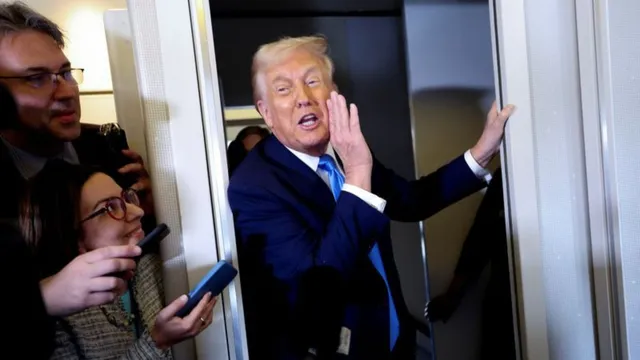- By Ajeet Kumar
- Fri, 27 Jun 2025 08:30 PM (IST)
- Source:JND
The US Supreme Court dealt a blow on Friday to the power of federal judges by restricting their ability to grant broad legal relief in cases as the justices acted in a legal fight over US President Donald Trump's bid to limit birthright citizenship, ordering lower courts that blocked the policy to reconsider the scope of their orders.
However, the court's 6-3 ruling authored by conservative Justice Amy Coney Barrett did not let Trump's policy go into effect immediately and did not address the policy's legality. The justices granted a request by the Trump administration to narrow the scope of three nationwide injunctions issued by federal judges in Maryland, Massachusetts and Washington state that halted enforcement of his directive while litigation challenging the policy plays out.
On his first day back in office, Trump signed an executive order directing federal agencies to refuse to recognise the citizenship of children born in the United States who do not have at least one parent who is an American citizen or lawful permanent resident, also called a "green card" holder.
Order could affect 1.5 lakh babies born annually in US
More than 1,50,000 newborns would be denied citizenship annually under Trump's directive, according to the plaintiffs who challenged it, including the Democratic attorneys general of
22 states as well as immigrant rights advocates and pregnant immigrants. The case before the Supreme Court was unusual in that the administration used it to argue that federal judges lack the authority to issue nationwide, or "universal," injunctions, and asked the justices to rule that way and enforce the president's directive even without weighing its legal merits.
ALSO READ: New H-1B Visa Rules: How Will It Impact Indian Students With F-1 Visas, Details Here
Federal judges have taken steps including issuing nationwide orders impeding Trump's aggressive use of executive action to advance his agenda.
"Illegal and cruel"
The American Civil Liberties Union called the ruling troubling, but limited, because lawyers can seek additional protections for potentially affected families. "The executive order is blatantly illegal and cruel. It should never be applied to anyone," said Cody Wofsy, deputy director of the ACLU Immigrants' Rights Project. "The court's decision to potentially open the door to enforcement is disappointing, but we will do everything in our power to ensure no child is ever subjected to the executive order."
ALSO READ: Trump Administration Seeks To Limit Birthright Citizenship Again: What's At Stake? Explained
The plaintiffs argued that Trump's directive ran afoul of the 14th Amendment, which was ratified in 1868 in the aftermath of the Civil War of 1861-1865 that ended slavery in the United
States. The 14th Amendment's citizenship clause states that all "persons born or naturalized in the United States, and subject to the jurisdiction thereof, are citizens of the United States
and of the state wherein they reside."
(With inputs from agency)

